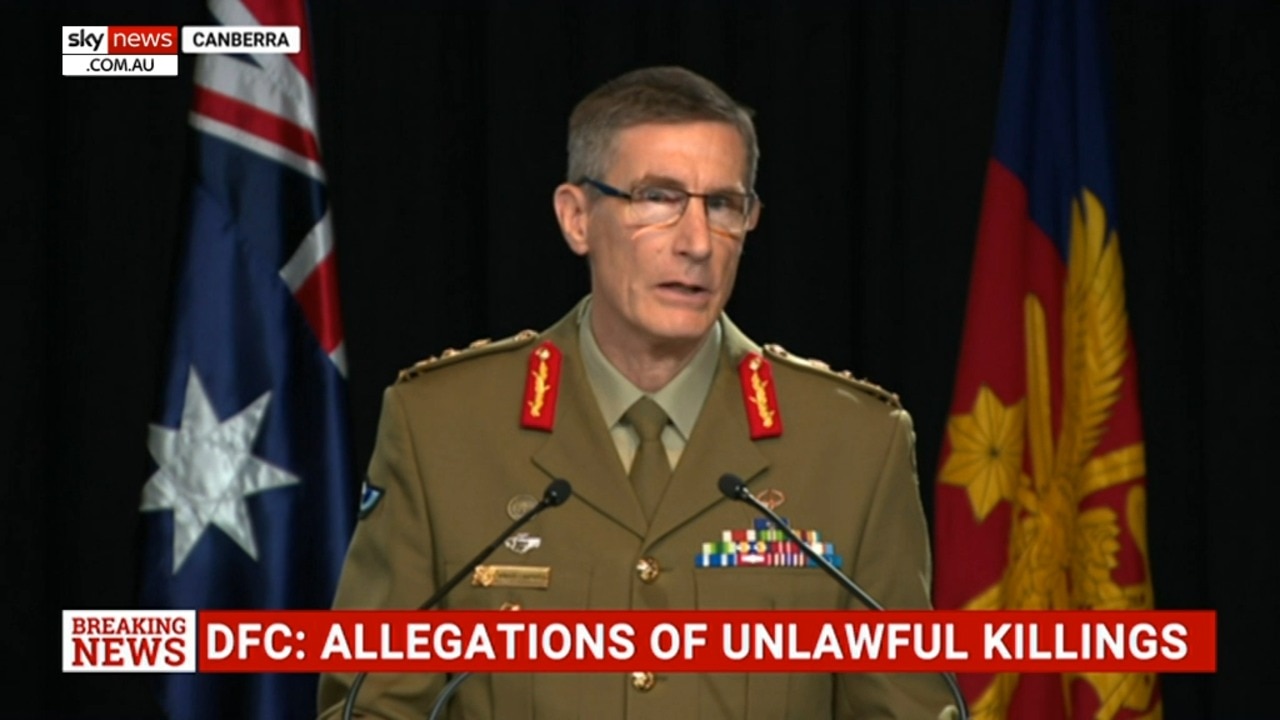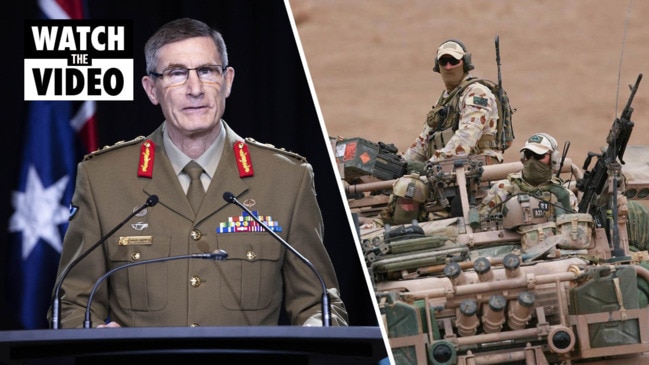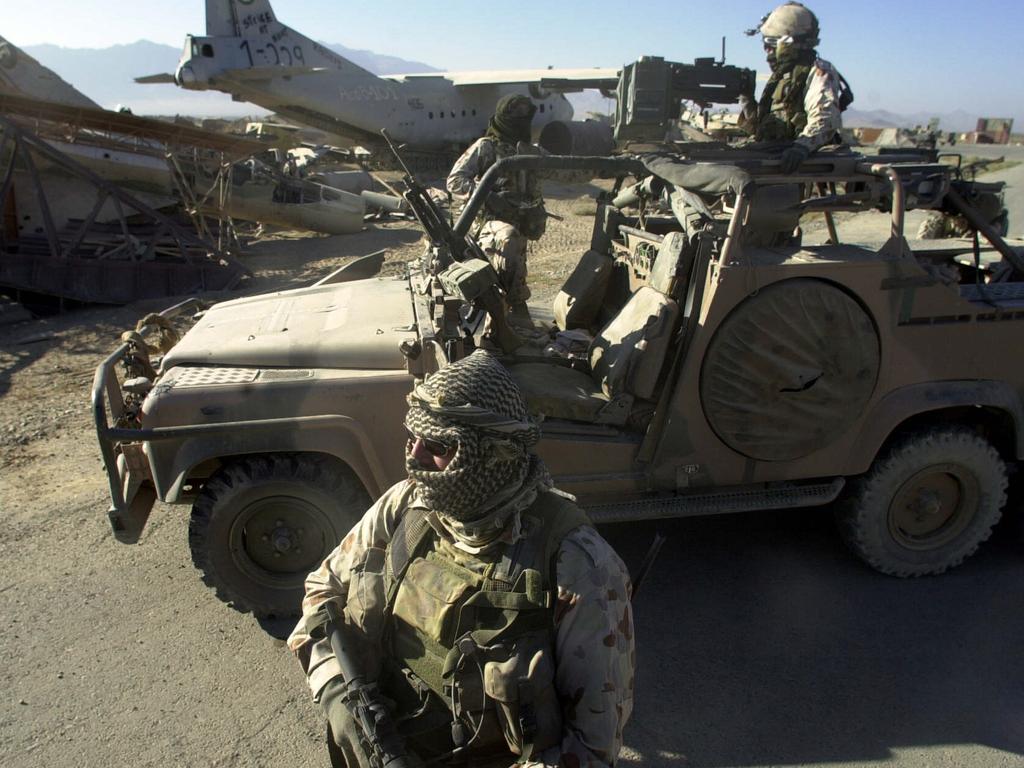War crimes inquiry: ‘Misguided warrior culture’: ADF chief Angus Campbell’s full statement
Angus Campbell says none of the alleged unlawful killings were described as being in the ‘heat of battle’.

“Today, the Australian Defence Force is rightly held to account for allegations of grave misconduct by some members of our Special Forces community during operations in Afghanistan.
Before turning to the Inspector-General’s report, it’s important to note that over the period from 2005 to 2016, more than 26,000 Australians served in Afghanistan, 3,000 of them in the Special Operations Task Group.
An enormous amount of good work was done by many, who should be proud of their contribution. What the Inspector-General finds is greatly at odds with that good effort, and damaging to our moral authority as a military force.
His Report details credible information regarding deeply disturbing allegations of unlawful killings by some. I respectfully ask Australians to remember and have faith in the service of the many. Let me assure you, I do.
To the people of Afghanistan, on behalf of the Australian Defence Force, I sincerely and unreservedly apologise for any wrongdoing by Australian soldiers.
I have spoken directly to my Afghan counterpart, General Zia, to convey this message.

Such alleged behaviour:
■ profoundly disrespected the trust placed in us by the people of Afghanistan, at a time when they had asked for our help,
■ it would have devastated the lives of Afghan families and communities, causing them immeasurable pain and suffering, and
■ it would have put in jeopardy both our mission and the safety of our Afghan and Coalition partners.
‘Sincerely sorry’
And to the people of Australia, I am sincerely sorry for any wrongdoing by members of Australian Defence Force. You’re right to expect that your defence force will defend our nation and its interests in a manner that accords with our nation’s values and laws.
Turning to the Inspector-General’s report. He found:
■ None of the alleged unlawful killings were described as being in the ‘heat of battle’.
■ None were alleged to have occurred in circumstances in which the intent of the perpetrator was unclear, confused or mistaken.
■ And every person spoken to by the Inquiry thoroughly understood the Law of Armed Conflict and the Rules of Engagement under which they operated. These findings allege the most serious breaches of military conduct and professional values.
The unlawful killing of civilians and prisoners is never acceptable.
It’s my duty, and that of my fellow Chiefs, to set things right. Accountability rests with those who allegedly broke the law and with the chain of command responsible for wider systemic failures, which enabled these alleged breaches to occur, and go undetected.
In order to deal with what happened, we need to understand how it could have happened. I will offer a preliminary view, arising from the findings of the Inspector General’s Report and my own professional judgment. It starts with culture.
‘Warrior culture’
The Report finds that some Special Air Service Regiment commanders in Australia, fostered within the SAS what, Justice Brereton terms a self-centred ‘warrior culture’. A misplaced focus on prestige, status and power, turning away from the Regiment’s heritage of military excellence fused with the quiet humility of service.
The Report notes this distorted culture was embraced and amplified by some experienced, charismatic and influential noncommissioned officers and their protégés, who fused military excellence with ego, entitlement and exceptionalism.
As units became consumed with preparing for and fighting the war, much of the good order and discipline of military life, fell away. Cutting corners, bending and ignoring rules was normalised.
What also emerged was a toxic competitiveness between the Special Air Service Regiment and the 2nd Commando Regiment; destructive of trust, cohesion and mission. And a disgrace to both.
Not correcting this culture, as it developed, was a failure of both unit and higher command.
Turning now to the challenging counter-insurgency environment in Afghanistan. People detained would be released if there was no formal evidence to link them to insurgent activity.
‘Catch and release’, as it came to be known throughout the Coalition, was frustrating and carried with it some risk, but it was also understood to be a necessary point of balance between the needs of security and the needs of justice, both essential in the conduct of a counter insurgency operation.
In this context, it’s alleged that some patrols took the law into their own hands: rules were broken, stories concocted, lies told, prisoners killed, and once that rule was broken, so too was further restraint.

Those who wished to speak up were allegedly discouraged, intimidated and discredited.
Here I want to emphasise again that the overwhelming majority of Special Forces soldiers did not choose to take this unlawful path. No matter the stress and the strain of battle, they remained true to our values and our laws.
They are truly special. Special for the self-discipline and courage they constantly displayed. I admire them, and they deserve to be praised for upholding our culture of service before self.
Culture also affected reporting.
Deviations from professional standards
The Inspector General finds that Troop, Squadron and Commanding Officers of some Special Operations Task Group rotations indirectly contributed to alleged criminal behaviour.
This occurred in a number of ways, but in particular, by accepting deviations from professional standards, by sanitising or embellishing reporting to avoid attracting attention, and by not challenging or verifying accounts given by those on the ground.
Oversight mechanisms such as legal reviews, operational assessments and inquiries took place, but they were not sufficiently rigorous or independent. Individuals and processes were either suborned into the culture that had emerged, obstructed by it, or frustrated by the silence it bred.
This Inquiry found no evidence there was knowledge of, or reckless indifference to, the commission of war crimes, on the part of Troop, Squadron and Task Group Commanders, or higher commanders.
Moral responsibility
However, being unaware of, or even deliberately kept unaware of unlawful actions, does not relieve commanders of moral responsibility. And the Report finds Task Group commanders bear responsibility for what happened under their command.
Higher arrangements for command and control were found to be too dispersed and too distant to consistently give effective direction and control to the Special Operations Task Group.
While commanders at many levels described the status of Special Operations Command as ‘stretched but manageable’, none appreciated that reporting and governance systems, which routinely described extraordinary performance, were no longer reflecting the whole truth on the ground.

Reporting was positive. And soldiers and field commanders alike showed genuine enthusiasm for the campaign and their continuing participation in it. Nevertheless, higher command should have recognised sooner that Special Operations Command units were unable to sustain all the demands placed upon them.
Justice Brereton considered in detail 57 allegations of incidents and issues.
He found there to be credible information to substantiate 23 incidents of alleged unlawful killings of 39 people, perpetrated by 25 Australian Special Forces soldiers, predominantly from the Special Air Service Regiment.
Those alleged to have been unlawfully killed were all people under control, in lay-terms prisoners, farmers and other civilians.
‘Shameful record’
This shameful record includes alleged instances in which new patrol members were coerced to shoot a prisoner to achieve the soldier’s first kill, in an appalling practice known as ‘blooding’.
Further to this, ‘throwdown’ weapons and radios were also reportedly planted to support claims that people killed were ‘enemy killed in action’.
Some of these incidents took place in 2009 and 2010, with the majority occurring in the latter years of 2012 and 2013.
Alleged perpetrators deployed on between one and five Special Operations Task Group rotations over the period 2006 to 2013.
I have accepted all of the Inspector-General’s findings and a comprehensive implementation plan is being developed to action his 143 recommendations, and any additional measures as required.
I will lead this effort, supported by the Chief of Army, and other senior Defence leaders.
We will report progress on a quarterly basis to the Minister for Defence. The independent Afghanistan Inquiry Implementation Oversight Panel will have complete access to our work.
The recommendations deal with three main issues: culture; command, reporting and governance; and within that wider context, individual and collective accountability.
Firstly, in terms of culture, Army has, in parallel with this Inquiry, driven a comprehensive reform program within Special Operations Command over the last five years. This program focuses on ethical leadership, good governance and command responsibility.
Resistance to change
While much good progress has been made, the Report notes that elements of resistance to change and professionally corrosive attitudes or behaviours persist.
The Inspector-General’s recommendations will strengthen and accelerate Army’s reform of Special Operations Command.
The allegations contained in this report are a tragic reminder of why the authority, military excellence, and small team autonomy, so necessary for special operations, are only secondary factors in our military success.
Prime, always, is the nurturing of character and culture, from which our people derive the strength to do what’s right, in the most difficult of circumstances. Defence’s senior leadership team is committed to sustaining and promoting good culture, driven by Defence values and behaviours, which empowers military capability.
We have no tolerance for anything else and we will strengthen ethical leadership training across the force.
Secondly, our command, reporting and governance will be improved by:
■ Strengthening command and governance arrangements within and of Special Operations Command.
■ Revising the Australian Defence Force’s model of command and control arrangements of Special Forces within coalition operations.
■ Enhancing the record of action for Special Forces patrol operations, through the use of digital technology.
■ Improving the capacity, continuity and independence of review and inquiry processes on operations.
■ And strengthening the Inspector General’s role in operational oversight.
Thirdly, with regard to individual and collective accountability: Individuals alleged of unlawful, criminal conduct will be referred to the Office of the Special Investigator.
Individuals alleged to be negligent in the performance of their duty will be managed through administrative and disciplinary processes.
Collective responsibility
Where decisions were made in good faith, individuals and the force more generally, must and will learn from this experience, by embedding it into our training and education system.
As proposed in the Report, I will review and make recommendation to the Governor General, with regard to the honours and awards received by a range of officers, for service in both Australia and Afghanistan.
Units live and fight as a team. The Report acknowledges, therefore, that there is also a collective responsibility for what is alleged to have happened.
With this in mind, I have accepted the Inspector-General’s recommendation, and will again write to the Governor General, requesting he revoke the Meritorious Unit Citation awarded to
Special Operations Task Group rotations serving in Afghanistan between 2007 and 2013.
Separately, the Chief of Army will today also announce changes to the Army’s Order of Battle, that is, its organisational structure.
While necessary, I appreciate that these latter decisions will, for many, be a bitter blow.
The Report includes some very recent lines of inquiry, only partially considered by Justice Brereton’s team. If anyone has new or additional information related to misconduct by Australian military personnel in Afghanistan, I strongly encourage you to provide it to the Office of the Special Investigator, once established.
In the interim, please contact the Office of the Inspector General of the Australian Defence Force.
A redacted form of the Inquiry Report will shortly be available. To ensure the procedural fairness of potential future investigations and possible court proceedings, I cannot however release Part II of the Report, which contains the details of specific incidents.
In conclusion, I thank the Inspector General, Mr Jim Gaynor, and Justice Paul Brereton and his team, for your comprehensive and tireless efforts in conducting the Afghanistan Inquiry, and UK Professor David Whetham, for his important contribution to the Inquiry’s consideration of systemic factors.
Make us a better force
And I thank everyone who has come forward to speak to the Inquiry. Your commitment to sharing your experience will help make us a better force.
I would also like to acknowledge the work of Dr Samantha Crompvoets, who first brought this issue to higher command attention, Major General Jeff Sengelman, who had the moral courage to confront it, and Mr David Irvine for his assistance in Special Operations reform.
I know this Inquiry has taken a considerable toll on our people and their families. We will continue to support those affected and I encourage people to seek assistance.
I again acknowledge and thank those many thousands of Australians who served in Afghanistan and did the right thing, professionally and with honour; including many of our Special Forces personnel. You did extraordinary work.
The actions of some do not represent the integrity and value of your service. You should be rightly proud of your place in our nation’s history.
Today marks an important but difficult step forward for the Australian Defence Force and our people.
Thank you for your continued service to this great nation – ethically, lawfully and in a way that speaks to our lived values; Service, Courage, Respect, Integrity and Excellence.






To join the conversation, please log in. Don't have an account? Register
Join the conversation, you are commenting as Logout